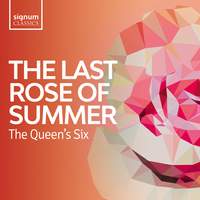Interview,
The Queen's Six on The Last Rose of Summer
 In an often crowded market for a cappella vocal ensembles, the London-based Queen's Six stand out for the closeness of their blend, a result of their alternate existences as lay clerks at St George's Chapel, Windsor. Not only do they sing together eight times a week, they also live in the Chapel grounds – creating a unique social and musical bond.
In an often crowded market for a cappella vocal ensembles, the London-based Queen's Six stand out for the closeness of their blend, a result of their alternate existences as lay clerks at St George's Chapel, Windsor. Not only do they sing together eight times a week, they also live in the Chapel grounds – creating a unique social and musical bond.
Their latest release features a wide range of arrangements, both old and very new, of folksongs from around the British Isles. I spoke to bass Simon Whiteley about the unique ways that the folk and choral traditions meet on this album.
These are very much concert arrangements – few people would call this an album of true folk music. Do you think something is lost in transferring music of this kind from its native, often semi-improvised, setting into the relatively formalised context of the classical vocal ensemble?
Of course, the rugged, “in the field” nature of some of these pieces might be lost in these arrangements, but that is one of the wonderful aspects of folk songs: their versatility. They are such powerful and humanistic compositions that they lend themselves to all sorts of different treatments. As a concert ensemble, we have occasionally performed concerts with less accompanied, more improvised versions of some of these songs, and it is something we have discussed doing more in the future.
The British folk music scene itself is of course sizeable and healthy – are any of your members musically active in this world as well?
Andrew Thompson’s (our baritone’s) father-in-law is quite active in the performance of authentic folk songs, and is in fact very keen to make sure that the Westmorland dialect survives. Dr Andrew Plant (author of our CD notes) is also a great advocate of folk songs, and has spent time doing research at Cecil Sharp House in London. He also wrote one of the arrangements on this disc: the wonderful The Water of Tyne.
There are a large number of different arrangers featured on this album – from Holst, Vaughan Williams and Grainger to contemporary musicians including your own Tim Carleston and Daniel Brittain. Do you get any sense that the specific personalities or styles of the arrangers come through in their adaptations of folk songs?
Absolutely. The jazz backgrounds of Alexander L’Estrange and Tim Carleston come out in some of their harmony; Stephen Carleston has a background as an organist, and his Bobby Shaftoe includes a Bach fugue based on the melody; Ruairi Bowen is a great friend of ours, and again his jazz background, and especially his sense of humour, shine through. As for the older arrangements, one finds it hard to listen to Percy Grainger’s music without feeling there’s something quite sensual, almost erotic, about it. Knowing what we do about the composer, it’s not hard to see why. Brigg Fair does not disappoint in this respect!
The Welsh language isn’t exactly an easy one for non-speakers to tackle, either in speech or in song, and many would simply balk at the very idea; what was behind the decision to sing Suo Gân in English but Land of my Fathers in Welsh?
Suo Gân is the most poignant arrangement on the disc, dedicated to the memory of Organist John Scott. John’s wife, Lily, was pregnant with their son, Arthur, at the time of John’s passing, and the song is a most fitting lullaby. We felt the text of such a poignant and beautiful setting deserved to be understood by the widest possible audience, hence the decision to record that arrangement in English.
Land of my Fathers is such a well-known song, both thanks to the rugby, and the fact that it has been more or less adopted as Wales’ unofficial National Anthem, that we felt it almost ought to be sung in Welsh. We also very much enjoyed the challenge of singing in such an unusual language!
Both your ensemble’s sound and the spirit of many of these arrangements call to mind the King’s Singers. Do you see yourselves as following in their footsteps, or do you have a different ethos as a group?
We have the hugest respect for the King’s Singers, and as a 6 part, men’s voice a cappella ensemble, of course there are similarities. We have never thought of ourselves as following in their footsteps, as we have always striven to “do what we do”, as it were. Those who come to our live shows will often comment on the sense of humour of the group, and we love to mess about on stage, show our individual personalities, and generally make the audience laugh. And that, I think, is a big part of our ethos: to entertain.
The story of Vaughan Williams, Cecil Sharp and others going out into the fields to record folk-songs in their “natural habitat” is quite well-known. Do you think we’d still have the two dozen songs on this album if they hadn’t done so, or would those traditions have simply died out?
I think without the gatherings of Sharp and Vaughan Williams, these songs certainly wouldn’t have made it to such a wide audience. But it is the aforementioned power and versatility of these folk songs that make one think that perhaps they would have survived on their own. Of course, we will never know the answer, but it’s just as well that they did; these incredible songs deserve to be heard by the very widest audience possible!



